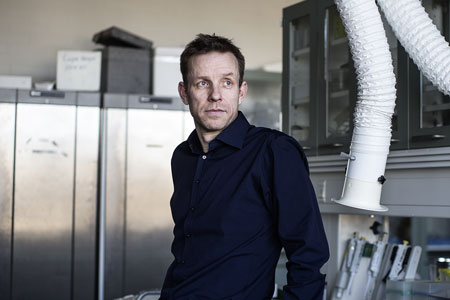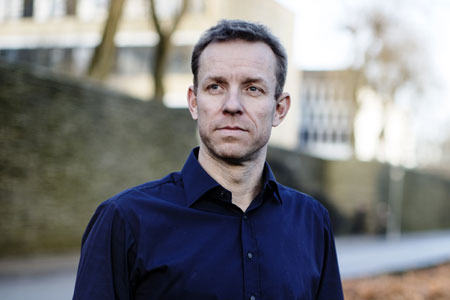“Some perceive me as one-track minded—and rightfully so,” says Head of Department and Researcher Thomas L. Andresen. His working week is never less than 60 hours. But hard work is the price of success.
“Do you think I’m a nerd?” asks Thomas L. Andresen, just as I’m leaving the room. Throughout the hour-long interview, he has spoken about the necessity of being one-track minded. No, I don't think so. Of course, Thomas L. Andresen is heavily involved in technology and the natural sciences. But to me, he is an outgoing person with a wide range of interests. In addition to his passion for research, he is interested in politics and eager to help others.
That said, the fact is that the 44-year-old Thomas L. Andresen’s working week is never less than 60 hours. As professor and head of department for DTU Nanotech, he focuses on what gets results. And one has to say that in that regard, he has been highly successfully. Thomas Lars Andresen’s research has generated significant results in design, production, and the application of nanoparticles for targeted drug delivery and therapy. He researches into systems that deliver immunostimulatory molecules to the cancer patient’s own immune cells and program them to recognize cancer cells.
His list of publications includes more than 110 articles in international journals. He is co-inventor of approx. 20 patent families and has received a number of prestigious grants—most recently the EliteForsk Award,which the Danish Council for Independent Research is behind. He has also received an ERC (European Research Council) starting grant and a DFF Sapere Aude Top Researcher grant—not to mention several other awards for his research efforts.
May seem ludicrous
"The very fact that I work several 13-14 hour days a week might seem completely ludicrous to normal people. But hard work is the price of success. This is where narrow-mindedness comes in."
Professor and Head of Department Thomas Lars Andresen, DTU Nanotech

“I don’t see myself as a nerd, but I’m aware that some people see me as being one-track minded—and rightly so. The very fact that I work several 13-14 hour days a week might seem completely ludicrous to normal people. But hard work is the price of success. This is where narrow-mindedness comes in,” says Thomas L. Andresen.
He thinks that he may be more ruthless in his execution by focusing on the things that produce results and doing away with those areas that do not—such as meetings and discussions. He thrives on doing several things at once, feeling the adrenaline flow, and pushing himself to produce results. The less he works, the greater the boredom. He tends to find interaction with others tiring. The other day, he talked to people from morning till evening. It is just like giving two or three lectures a day. He is less happy about that.
However, choosing to fully devote yourself to something comes at a high price. For Thomas L. Andresen, balancing work, children, and family poses a major challenge. He has maintained a high work rate since his student days when—on a couple of occasions—he took double semesters and grew accustomed to working more than the norm. For the past many years he has not had time to take a holiday. To relax, he has started taking trips by himself to Sweden or around Denmark. He is also a keen trail runner.
“Being a well-rounded person can be challenging when you’re single-minded—as many researchers have a tendency to become. So there are many things I’d like to do, but which I don’t have time for. Right now, I’d love to travel to Northern Norway, Sweden, or Alaska by myself for three weeks in a tent. But I simply don’t have the time...”
Will improve chemotherapy
It was not on the cards that Thomas L. Andresen would become a professor and head of department. Being declared ‘less suitable’ for high school, he took a technical sciences qualification and an apprenticeship at the Danish Broadcasting Corporation, where he worked as a programmer. Later, he began studying chemistry at DTU because he had been on a stimulating chemistry course.
He would have liked to study medicine, but today he has ended up working very closely with doctors. Since his time as a PhD student, he has focused on how to transport active substances into the cells in which they are to take effect. He has focused on improving chemotherapy and reducing its side effects, and researched into how to get chemotherapy out into the cells and combine it with radiation therapy.

“I’ve always been interested in doing something about cancer. This is due to a fear that we will all get it. Almost everyone knows someone who has it. My greatest goal is to find a cure for one or more types of cancer. It is hard to plan, and you also need a good portion of luck. But I firmly believe that I and my research group have a chance to make a real difference. It’s a certainly a prime motivator in my daily work,” says Thomas L. Andresen.
On a normal weekday, the alarm clock rings at 7:30 a.m. He responds to emails for about an hour before meeting for work at 9.00 a.m. At around 6.00 or 7.00 p.m., he drives home and eats dinner with the family. At 10.00 p.m., he sits down at the computer again and continues working until 1.00 or 2.00 a.m.
Top researcher and head of department
He undertook the role of head of department at DTU Nanotech in 2016, and makes no bones about the fact that this role comes first. Here, he is responsible for daily administration and for defining strategies that steer the department in the right direction and ensure that it can continue to renew its research. His role as top researcher comes second. Here, his job is to look at visions, directions, and results. Where should the group be heading in terms of research—and how?
“Being a researcher and head of department is a major challenge. I really want to show that it’s possible to have an active research career while being head of department. I think diversity is a good thing so not all heads of department have the same profile. This creates a different dynamic,” says Thomas L. Andresen.
He believes that in the future, engineers will change the way we manufacture drugs. At the global level, the pharmaceutical industry has largely switched its focus from small molecules to complex biological drugs, with the introduction of ever more sophisticated drugs—for example, products based on the patient’s own immune cells which can be modified to kill cancer cells.
It is even possible that some of the new technologies that use immune cells to treat cancer could also be used to treat autoimmune illnesses and diabetes. Treatment of this kind may become truly groundbreaking—on a par with the discovery of penicillin, says Thomas L. Andresen.
“Engineers have a key role to play in drug production and a growing one in the pharmaceutical industry in general, but looking to the future, we can expect them to play a decisive role in the development of the industry. The traditional boundaries between research, development and production will be broken down and replaced by automated processes, rapid analysis methods, and new production methods. Engineers will be crucial in ensuring that Danish businesses can compete in this development.”
Switch tracks
Thomas L. Andresen has been toying with the idea of relocating to Boston to work at the Massachusetts Institute of Technology (MIT). But he is happy in Denmark. Life science research is thriving, not least thanks to donations from private and public foundations.
In recent years, however, he has become increasingly aware of the narrow-mindedness inherently associated with continuing as a university researcher. Perhaps there are other things that could enrich his life?
“I often wonder whether what I’m doing is the most fulfilling. It can be very instructive changing track and reinventing yourself—something I’ve done repeatedly over the years. If I follow the same path, the challenge grows ever smaller and I feel less and less inclined to keep going. You have to ask yourself the question: am I staying here because I’m comfortable—or because I can see new opportunities.